Tissue lev - Study guides, Class notes & Summaries
Looking for the best study guides, study notes and summaries about Tissue lev? On this page you'll find 148 study documents about Tissue lev.
Page 4 out of 148 results
Sort by
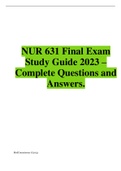
-
NUR 631 Final Exam Study Guide 2023 – Complete Questions and Answers | Latest Guide 2023
- Exam (elaborations) • 40 pages • 2023
-
- $15.99
- + learn more
NUR 631 Final Exam Study Guide 2023 – Complete Questions and Answers. Describe the type of lesions found in psoriasis & seborrheic and actinic keratosis. Elevated, firm, and rough lesion with flat top surface greater than 1 cm in diameter Describe the skin lesions found in Varicella (chickenpox) and herpes zoster (shingles). Elevated circumscribed, superficial lesion filled with serous fluid, less than 1 cm in diameter Describe the pathogenetic mechanism of polycystic ovarian syndrome (POS). P...
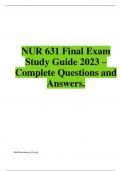
-
NUR 631 Final Exam Study Guide 2023 – Complete Questions and Answers | Latest Guide 2023
- Exam (elaborations) • 40 pages • 2023
-
- $17.99
- + learn more
NUR 631 Final Exam Study Guide 2023 – Complete Questions and Answers. Describe the type of lesions found in psoriasis & seborrheic and actinic keratosis. Elevated, firm, and rough lesion with flat top surface greater than 1 cm in diameter Describe the skin lesions found in Varicella (chickenpox) and herpes zoster (shingles). Elevated circumscribed, superficial lesion filled with serous fluid, less than 1 cm in diameter Describe the pathogenetic mechanism of polycystic ovarian syndrome (POS). P...

-
BIOL 235 CHAPTER 1 – INTRODUCTION TO THE HUMAN BODY,BIOL 235 CHAPTER 2 – THE CHEMICAL LEVEL OF ORGANIZATION, BIOL 235 CHAPTER 3 – THE CELLULAR LEVEL OF ORGANIZATION, BIOL 235 CHAPTER 4- THE TISSUE LEVEL OF ORGANIZATION, BIOL 235 CHAPTER 5 – INTEGUMENTARY,
- Package deal • 9 items • 2022
-
- $17.49
- + learn more
BIOL 235 CHAPTER 1 – INTRODUCTION TO THE HUMAN BODY,BIOL 235 CHAPTER 2 – THE CHEMICAL LEVEL OF ORGANIZATION, BIOL 235 CHAPTER 3 – THE CELLULAR LEVEL OF ORGANIZATION, BIOL 235 CHAPTER 4- THE TISSUE LEVEL OF ORGANIZATION, BIOL 235 CHAPTER 5 – INTEGUMENTARY, BIOL 235 CHAPTER 7 – THE SKELETAL SYSTEM: THE AXIAL SKELETON, BIOL 235 CHAPTER 8 – THE SKELET
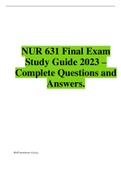
-
NUR 631 Final Exam Study Guide 2023 – Complete Questions and Answers | Latest Guide 2023
- Exam (elaborations) • 40 pages • 2023
-
- $14.99
- + learn more
NUR 631 Final Exam Study Guide 2023 – Complete Questions and Answers. Describe the type of lesions found in psoriasis & seborrheic and actinic keratosis. Elevated, firm, and rough lesion with flat top surface greater than 1 cm in diameter Describe the skin lesions found in Varicella (chickenpox) and herpes zoster (shingles). Elevated circumscribed, superficial lesion filled with serous fluid, less than 1 cm in diameter Describe the pathogenetic mechanism of polycystic ovarian syndrome (POS). P...
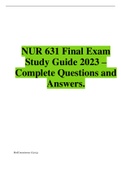
-
NUR 631 Final Exam Study Guide 2023 – Complete Questions and Answers | Latest Guide 2023
- Exam (elaborations) • 40 pages • 2023
-
- $13.99
- + learn more
NUR 631 Final Exam Study Guide 2023 – Complete Questions and Answers. Describe the type of lesions found in psoriasis & seborrheic and actinic keratosis. Elevated, firm, and rough lesion with flat top surface greater than 1 cm in diameter Describe the skin lesions found in Varicella (chickenpox) and herpes zoster (shingles). Elevated circumscribed, superficial lesion filled with serous fluid, less than 1 cm in diameter Describe the pathogenetic mechanism of polycystic ovarian syndrome (POS). P...
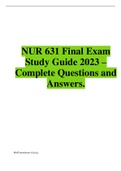
-
NUR 631 Final Exam Study Guide 2023 – Complete Questions and Answers | Latest Guide 2023
- Exam (elaborations) • 40 pages • 2023
-
- $13.99
- + learn more
NUR 631 Final Exam Study Guide 2023 – Complete Questions and Answers. Describe the type of lesions found in psoriasis & seborrheic and actinic keratosis. Elevated, firm, and rough lesion with flat top surface greater than 1 cm in diameter Describe the skin lesions found in Varicella (chickenpox) and herpes zoster (shingles). Elevated circumscribed, superficial lesion filled with serous fluid, less than 1 cm in diameter Describe the pathogenetic mechanism of polycystic ovarian syndrome (POS). P...
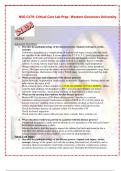
-
NSG C478: Critical Care Lab Prep- Western Governors University 2023
- Exam (elaborations) • 17 pages • 2023
-
- $15.99
- + learn more
NSG C478: Critical Care Lab Prep- Western Governors University Lab Day 1 Autonomic Dysreflexia 1. Describe the pathophysiology of the disease process. (Spinal cord injury, stroke, syncope) Autonomic dysreflexia is a complications of a spinal cord injury (occurs after the shock has subsides in the rehab faze). It occurs above the T-5 T-6, T-12 level (between the two paraplegia with trunk and leg involvement normal arm and hand movement. Paraplegia with fair ability to control balance and...

-
NUR-631-Final Exam-Study Guide- Grand Canyon University
- Exam (elaborations) • 15 pages • 2023
-
- $8.99
- 1x sold
- + learn more
Final Exam – Study Guide Definitions/Descriptions Describe the type of lesions found in psoriasis & seborrheic and actinic keratosis. Elevated, firm, and rough lesion with flat top surface great er than 1 cm in diameter Describe the skin lesions found in Varicella (chickenpox) and herpes zoster (shingles). Elevated circumscribed, superficial lesion filled with serous fluid, less than 1 cm in diameter Describe the pathogenetic mechanism of polycystic ovarian syndrome (POS). POS has at least two...
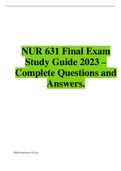
-
NUR 631 Final Exam Study Guide 2023 – Complete Questions and Answers | Latest Guide 2023
- Exam (elaborations) • 40 pages • 2023
-
- $15.99
- + learn more
NUR 631 Final Exam Study Guide 2023 – Complete Questions and Answers. Describe the type of lesions found in psoriasis & seborrheic and actinic keratosis. Elevated, firm, and rough lesion with flat top surface greater than 1 cm in diameter Describe the skin lesions found in Varicella (chickenpox) and herpes zoster (shingles). Elevated circumscribed, superficial lesion filled with serous fluid, less than 1 cm in diameter Describe the pathogenetic mechanism of polycystic ovarian syndrome (POS). P...
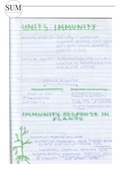
-
The Answer Series Grade 11 LIFE SCIENCES 3in1 IEB: MODULE 2 Life a the molecular, cellular, and tissue level, Unit 1: Biodiversity of microorganisms
- Summary • 6 pages • 2022
-
Available in package deal
-
- $3.55
- + learn more
The Answer Series Grade 11 LIFE SCIENCES 3in1 IEB: MODULE 2 Life a the molecular, cellular, and tissue level, Unit 1: Biodiversity of microorganisms. These summaries include hand-drawn images and flow diagrams and are easy to understand.

$6.50 for your textbook summary multiplied by 100 fellow students... Do the math: that's a lot of money! Don't be a thief of your own wallet and start uploading yours now. Discover all about earning on Stuvia


